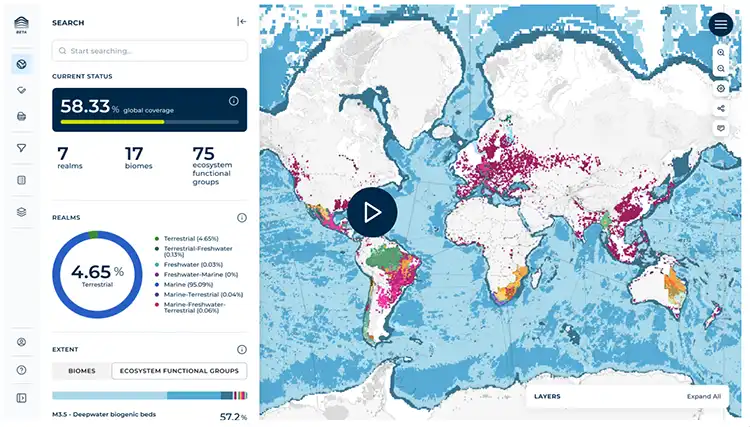
Just over half the world’s ecosystems have been mapped so far. The Global Ecosystems Atlas will help to monitor them, and could help chart the rest
By
A new conservation tool, the Global Ecosystems Atlas, has been launched with the goal of providing a comprehensive and harmonised resource for mapping and monitoring all the world’s ecosystems. Unveiled this week at the 2024 United Nations Biodiversity Conference (COP16) in Cali, Colombia, by the Group on Earth Observations (GEO), the atlas aims to support the protection, restoration, and sustainable management of ecosystems – a task that is critical to addressing global environmental crises.
Monitoring ecosystems will be instrumental in implementing the Kunming-Montreal Global Biodiversity Framework, an international agreement aimed at halting and reversing biodiversity loss by 2030. Despite the growing threats to biodiversity, many fundamental questions about our ecosystems remain unanswered due to inconsistencies in existing data. Just over half the world’s ecosystems have been mapped so far and, even with global indicators for ecosystem monitoring, there is no consistent method for compiling data on a worldwide scale.
Related reads:
‘Ecosystems are our planet’s life support, yet understanding them has been hindered not only by a lack of data but by the complexity of the stakeholder landscape, with many believing agreement on a common tool was impossible,’ says Yana Gevorgyan, Director of the GEO Secretariat. ‘The launch of the Global Ecosystems Atlas proof-of-concept is a testament to perseverance and collaboration, showing that when we come together with intention and purpose, we can overcome obstacles and work towards a transformative change.’
By providing access to high-quality, reliable and standardised data on ecosystems worldwide, the atlas will help identify priority areas for conservation and restoration – which could make it an invaluable resource for policymakers, financial institutions, private companies, and local communities.

‘The escalating triple crisis of climate change, biodiversity loss, and land degradation require immediate and effective action,’ says Astrid Schomaker, Executive Secretary of the Secretariat of the Convention on Biological Diversity. ‘The Global Ecosystems Atlas is the first intergovernmental effort to develop a collation of the best ecosystem data from countries and it will serve as a critical tool by providing high-quality, reliable data on ecosystems around the world.’
‘We urge all stakeholders to join us in realising the full potential of the Global Ecosystems Atlas by contributing, utilising and spreading awareness to foster a sustainable future for generations to come,’ adds Gevorgyan.




